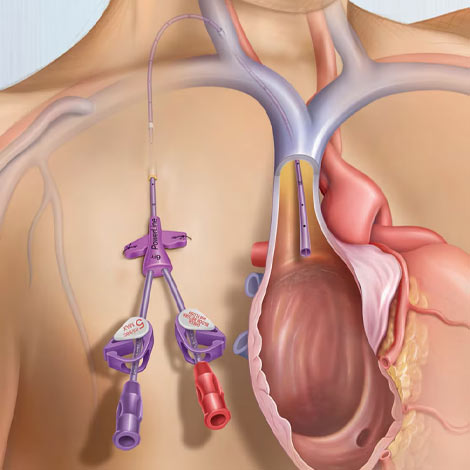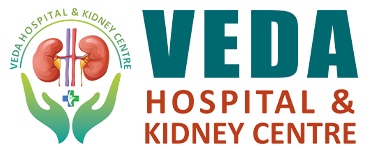Tunneled Catheter Insertion in Vijayawada
What is Tunnelled Catheter Insertion?
Tunnelled catheter insertion is a medical procedure used to place a long-term catheter into a major vein, usually in the chest, for hemodialysis or other therapies. This type of catheter is “tunnelled” under the skin and into a central vein to reduce the risk of infection and secure long-term vascular access. It plays a crucial role in kidney care, particularly for patients who require dialysis and do not have a functional arteriovenous fistula or graft.
Why is Tunnelled Catheter Insertion Done?
Tunnelled catheters are essential for patients who require regular hemodialysis. They are typically used when other forms of access like fistulas or grafts are not possible due to vascular conditions, urgent need for dialysis, or patient-specific health factors. Tunnelled catheters provide a reliable route for the removal and return of blood during dialysis.

Procedure of Tunnelled Catheter Insertion
The procedure is usually done under local anesthesia with ultrasound and fluoroscopic guidance. A small incision is made on the chest wall where the catheter is inserted into a central vein, often the internal jugular vein. The catheter is then tunneled under the skin to a separate exit site, which is strategically located to reduce infection and ensure patient comfort. Once inserted, the catheter allows for high blood flow rates required for effective dialysis.
Benefits of Tunnelled Catheters
- Long-term vascular access
- Lower infection rate than temporary catheters
- Can be used immediately after placement
- Better patient comfort and mobility
Risks and Complications
As with any invasive procedure, tunnelled catheter insertion has potential risks such as infection, bleeding, thrombosis, catheter malfunction, and venous stenosis. These risks are minimized when the procedure is performed by experienced professionals like Dr. M.V. Viswanath at Veda Hospital & Kidney Centre, a trusted Tunnelled Catheter Insertion Hospital in Vijayawada.
Who Needs a Tunnelled Catheter?
Patients suffering from end-stage renal disease (ESRD) who need long-term dialysis access are ideal candidates. Tunnelled catheters are also suitable for patients awaiting fistula maturation, those with poor vascular anatomy, or in cases where temporary dialysis is needed over a longer period.
Post-Procedure Care
After catheter placement, proper care and hygiene of the insertion site are vital. Patients are advised to avoid heavy lifting and water exposure at the exit site until healing occurs. Regular dressing changes and inspection for signs of infection are also necessary. At Veda Hospital & Kidney Centre, patients receive detailed post-operative instructions and follow-up care to ensure optimal outcomes.
Why Choose Veda Hospital & Kidney Centre?
When it comes to kidney-related procedures, expert care and precision are crucial. Under the guidance of Dr. M.V. Viswanath, a renowned Kidney Treatment Doctor in Vijayawada, the facility offers highly specialized tunnelled catheter insertions with state-of-the-art infrastructure and personalized care. Their experience ensures high success rates and minimal complications.
Frequently Asked Questions (FAQs) about Tunnelled Catheter Insertion
Is tunnelled catheter insertion painful?
The procedure is performed under local anesthesia, so pain is minimal. Some discomfort may be felt at the insertion site post-procedure, which subsides with time and medication.
How long does a tunnelled catheter last?
A well-maintained tunnelled catheter can last for several months or even longer, depending on patient health, hygiene, and dialysis needs.
Can I shower with a tunnelled catheter?
Patients are advised to keep the catheter site dry. Waterproof dressings may allow limited showering after a few weeks, but guidance should be taken from your nephrologist.
What are signs of infection to watch for?
Redness, swelling, warmth, pain, or discharge around the catheter site, and fever may indicate infection. Immediate medical attention is needed if these occur.
Is the catheter visible externally?
Yes, the catheter exits through the skin and remains visible externally. It is taped securely and should be handled only by medical professionals or trained caregivers.
How soon can dialysis start after the catheter is placed?
Dialysis can often begin immediately after the insertion procedure, making it an ideal option for patients needing urgent access.
How is a tunnelled catheter different from a temporary one?
Tunnelled catheters are designed for long-term use and have a lower risk of infection due to the subcutaneous tunnel and Dacron cuff. Temporary catheters are short-term and more prone to complications.
Can the catheter get blocked?
Yes, catheter blockage can occur due to clotting or kinks. Regular flushing and proper handling reduce the risk significantly.
Why should I choose Veda Hospital & Kidney Centre?
The hospital is a leading Tunnelled Catheter Insertion Hospital in Vijayawada with highly trained staff, expert doctors, and a track record of safe, effective procedures. Dr. M.V. Viswanath, a trusted Kidney Treatment Doctor in Vijayawada, ensures patient safety and comfort at every step.
Tunnelled catheter insertion is a life-saving procedure for many kidney patients undergoing dialysis. With proper technique, care, and professional expertise, it provides reliable and long-term vascular access. Choosing a specialized facility like Veda Hospital & Kidney Centre under the guidance of Dr. M.V. Viswanath guarantees superior outcomes. If you are seeking a Kidney Treatment Doctor in Vijayawada or looking for the best Tunnelled Catheter Insertion Hospital in Vijayawada, your search ends here.
Best healthcare providers

Unmatched Nursing Support

Top-notch Patient Care

Hospitable environment

Phenomenal intervention

